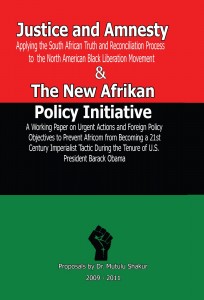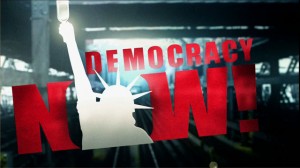Dr. Shakur has long been advocating for a Truth & Reconciliation Commission in the U.S.
 For more information, see:
For more information, see:
- Towards a Truth and Reconciliation Commission for New African/Black Political Prisoners, Prisoners of War and Freedom Fighters: A Discussion Paper by Dr. Mutulu Shakur (May 5th, 2010)
- Justice and Amnesty: Applying the South African Truth and Reconciliation Process to the North American Black Liberation Movement by Dr. Mutulu Shakur (January 1st, 2011)
Read these documents online using the links above or download both as a PDF.

- In May 2013, NAACP President Ben Jealous appeared on Democracy Now! and echoed Dr. Shakur’s call for a U.S. Truth and Reconciliation Commission.
Background
Dr. Shakur has not only taken responsibility for the actions for which he was convicted, but he has also become a staunch advocate for a Truth and Reconciliation Commission (also referred to as Truth and Justice Commission) to address the issue of slavery and racial injustice in the history of the United States. This is a testament to Dr. Shakur’s non-violent ideology for social and political change. Dr. Shakur’s main life passion now is to advocate for a Truth and Reconciliation Commission, such as the South African Model following the apartheid state, which will address the historical civil rights issues in the United States.
Worldwide, the use of Truth and Reconciliation Commissions (“TRCs”) and equivalent bodies, such as truth projects, appears to be accelerating. In the last thirty years, at least thirty-two TRCs have been established in twenty-eight countries, and half of these have been launched in the last decade. TRCs are independent bodies that examine human rights violations in public forums to help communities address problems together. TRCs recommend remedies, which often include apologies and reparations.
The issues Truth and Reconciliation Commissions have addressed in the past are diverse and range from investigating disappearances, abuse of Native American children, abuses under apartheid in South Africa, crimes of Communism, and to confront past racial, cultural and religious wrongs in many countries.
Recent Truth and Reconciliation Commissions and Truth Commissions have been established in the following nations:
- Argentina (National Commission on the Disappearance of Persons, 1983)
- Bolivia (National Commission of Inquiry into Disappearances, 1982)
- Chile (National Commission for Truth and Reconciliation, 1990; National Commission on Political Imprisonment and Torture, 2003),
- Democratic Republic of Congo (Truth and Reconciliation Commission, 2003)
- Ecuador (Truth and Justice Commission, 1996; Truth Commission, 2007)
- El Salvador (Commission of Truth, 1992)
- Germany (Commission of Inquiry for the Assessment of History and Consequences of the SED Dictatorship in Germany, 1992)
- Grenada (Truth and Reconciliation Commission, 2001)
- Guatemala (Commission for the Historical Clarification of Human Rights Violations and Acts of Violence which Caused Suffering to the Guatemalan People, 1997)
- Haiti (National Commission for Truth and Justice, 1995)
- Indonesia (Truth and Reconciliation Commission, 2004)
- Liberia (Truth and Reconciliation Commission, 2005)
- Morocco (Equity and Reconciliation Commission, 2004)
- Nepal (Commission of Inquiry to Locate the Persons Disappeared during the Panchayat Period, 1990)
- Nigeria (Human Rights Violations Investigation Commission, 1999)
- Panama (Truth Commission, 2001)
- Peru (Truth and Reconciliation Commission, 2000)
- South Africa (Truth and Reconciliation Commission, 1995)
- South Korea (Truth Commission on Suspicious Deaths, 2000)
- Sri Lanka (Commission of Inquiry into Involuntary Removal and Disappearances of Persons 1994)
- Uganda (Commission of Inquiry into the Disappearance of people in Uganda, 1974 and Commission of inquiry into Violations of Human Rights, 1986)
- Uruguay (Investigative Commission on the Situation of Disappeared People and its Causes, 1985, and Peace Commission, 2000)
- Yugoslavia, Federal Republic (Truth and Reconciliation Commission, 2001)
It is well known that between five-hundred thousand and six-hundred thousand enslaved Africans were imported into mainland North America, what is today the United States. Slaves in North America were chattel, no different in law from domesticated animals or pieces of disposable property. Sociologists widely agree that up to the present time the consequences of slavery are enormous and include widespread poverty, inadequate health care, inadequately funded schools, and disproportionate unemployment in Black communities.
Traditionally, Truth and Reconciliation Commissions seek to affect positive social change using good will, understanding, healing, and compassion — the antithesis of violence or illegal means to achieve social accountability and change.
Mutulu Shakur has joined numerous prominent academics, elected officials, law societies, and faith-based leaders proposing that a Truth and Reconciliation Commission be established to explore the roots of slavery and its impact on black communities today. Those advocating for the establishment of a Truth and Reconciliation Commission on the long-term impact of racial injustice in the United States are by definition absolutely committed to non-violent restorative justice based on the goodwill, understanding and self-reflection of people.
Dr. Shakur’s transformation and message in support of restorative justice is especially compelling given his background. While serving his sentence he has worked with incarcerated people and formerly incarcerated people in numerous constructive ways to address personal change and broader social change through peaceful and positive ways. He has the support of Homeboys Industries headed by Father Gregory Boyle, one of the most successful non-profit organizations in California engaged in gang intervention programs and job training and placement for formerly incarcerated youth. He has worked with formerly incarcerated people to establish programs such as the Center for Returning Citizens in Philadelphia, a program embracing and promoting family responsibility, community-based work, ethical behavior, and social consciousness for formerly incarcerated people through workshops, individual and group counseling sessions, job training and transitional housing programs. Dr. Shakur has for many years served as a mentor for the Center’s Executive Director Jondhi Harrell.
In summary, for many years Dr. Mutulu Shakur has exhibited a continuum of conduct aimed at peaceful and positive personal development and social change. His transformation has been consistent and long-standing.


I still support the movement but I also feel education has become another battleground for our children .I’d like to know as a mother who is raising the future what does Mr.Shakur think about the correlation between the educational system working with the courts to put our children away or stop them from attending school.
The SHUT-UP prison ministry definitely supports TRC`s concept of providing an mechanism to not only free pp`s &pow`s and how they became to be ,but also provides international support for the New Afrikan captive nation in North Amerkkka .